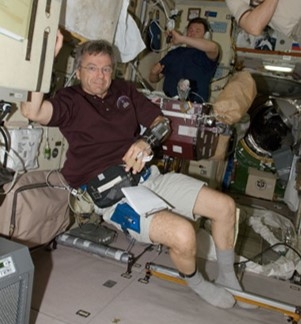Orthostatic hypotension is the technical term for a temporary drop in blood pressure when a person stands up after sitting or lying down because blood rushes to the feet, away from the brain. Dizziness or fainting due to changes in blood flow can occur after lengthy bed rest, among people with certain health disorders or, in the case of astronauts, being in a low-gravity environment.
A recent pilot study included 12 astronauts (eight men and four women age 43-56) who spent about six months in space. All performed individualized endurance and resistance exercise training for up to two hours daily during space flight to prevent cardiovascular, bone and muscle deconditioning. They also received a saline infusion upon landing. The astronauts' blood pressure was recorded with every heartbeat over each 24-hour period before, during and after their time in space. The researchers found that there was minimal impact on their blood pressure during all phases of measurement and none of the astronauts in the study experienced dizziness or fainting during routine activities 24 hours after landing.

Former Canadian Astronaut Robert “Bob” Thirsk wearing device which continuously measures blood pressure. Credit: NASA
Astronauts did not experience dizziness or fainting during routine activity after landing, as long as they participated in certain types of exercise training while in flight and receive IV fluids when they return to earth, concluded the study
The sample size was small and could not clearly distinguish whether specific in-flight blood pressure readings occurred while the astronauts were awake or asleep, so the data were combined and examined over 24-hour periods. Since all the astronauts participated in the exercise regimen and received a saline fluid infusion upon landing, researchers do not know the blood pressure stabilization would have occurred without those measures.
"Understanding the physiology of space flight can be helpful for understanding many conditions experienced by non-astronauts. For example, the exercise program our lab developed for the space program is already helping people with a fainting condition known as postural orthostatic tachycardia syndrome (POTS)," said Benjamin Levine, M.D., the study's senior author who is professor of Exercise Sciences at UT Southwestern Medical Center. "As we prepare to celebrate the 50th anniversary of the Apollo 11 moon landing, it's exciting to think of how our exploration in and of space can lead to important medical advances here on Earth."





Comments